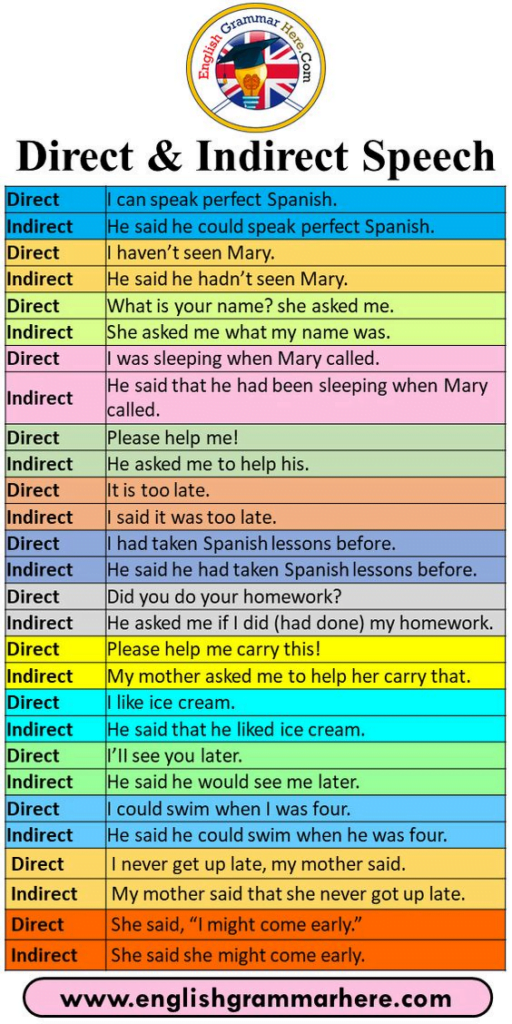Demonstrate use and command of reported speech

Reported speech is speech which tells you what someone said, but does not use the person’s actual words: for example, ‘They said you didn’t like it’, ‘I asked her what her plans were’, and ‘ Citizens complained about the smoke’.
There are two ways of writing down or reporting what was said on any occasion. We can repeat the actual words used (direct speech),
Monica said, ‘There’s nothing we can do about it.’or we can build the words into our own sentences (reported speech).
Monica said that there was nothing we could do about it.The words reported are normally accompanied by a reporting verb.
Monica said/declared that there was nothing we could do about it. ‘There is nothing we can do about it,’ Monica replied. Another name for reported speech is indirect speech.

Direct speech gives the actual words that the speaker used. It is common in novels and other writing where the actual words of a speaker are quoted.The reporting verb may come before the words that were actually spoken, or after them, or at a natural pause inside the reported sentence.

Monica said, ‘There is nothing we can do about it.’‘There is nothing we can do about it,’ Monica said.‘It’s no good,’ Monica said, ‘we’ll just have to ask for help.’

- The comma comes inside the quotation marks, unless the reporting verb is positioned inside a reported sentence that itself does not require a comma.
‘There is’, Monica said, ‘nothing we can do about it.’
- Typical reporting verbs are: agree, answer, ask, inquire, explain, say, tell, and wonder.
The subject and the reporting verb are sometimes reversed.
‘There is nothing we can do about it,’ said Monica.The actual words spoken always begin with a capital letter, unless the reporting verb comes within a sentence. They are separated from the reporting verb by a comma, unless they are followed by a question mark or an exclamation.
‘Why did you do it?’ she asked.‘Oh, mind your own business!’ he snapped.
- The words spoken are enclosed in inverted commas (single or double quotation marks).
‘Have you been to the new shopping mall yet?’ enquired Shona.“I’ve already seen it,” John replied.
- Single quotation marks are often used to draw attention to a word that is being mentioned for a particular purpose.
There is no such word as ‘fubber’. He called me a ‘stubborn old goat’.

When you use reported speech, the words put into the reported clause do not exactly match the words actually spoken.
‘I’ll leave here at 8.30 on Friday.’She says that she will leave home at 8.30 on Friday.‘I’m looking forward to seeing you.’She says she’s looking forward to seeing us.Pronouns and possessive determiners have to change in reported speech because of the change of speaker, e.g. I may become she; you may become us or him.
‘I believe you.’She said that she believed us.‘I’m leaving you.’She said that she was leaving him.‘I’ve finished.’She said that she had finished.Expressions of place and time may also have to change, e.g. here may become there or home; Friday may become in three days’ time.
‘I’ve been here before.’ She said that she had been there before. ‘I’ll see you on Monday. ‘She said that she would see him in three days’ time.
The verb may also change, e.g. must becomes had to in reported speech. The most common change is a change of tense.
‘Hello Jake? It’s me, Penny. I’ve arrived here on time, and I’m going to take a bus to your place. There’s one coming now, so I’d better run.’She rang to say that she’d arrived there on time and was going to take a bus to our place. Then she said that one was coming at that very moment, so she had to run.A reporting verb in the present tense can be used in the main clause when you report on a letter or on a recent conversation, e.g. a telephone conversation.

‘Hello, Jake? I’ve arrived here on time, and I’m going to take a bus to your place.’Penny has just phoned. She says that she has arrived on time and that she’s coming here by bus.However, it is more common to use a past tense when reporting speech.The changes of tense may be summarized as follows:
| direct speech | reported speech |
| present simple | past simple |
| present continuous | past continuous |
| present perfect | past perfect |
| present perfect continuous | past perfect continuous |
| past simple | past perfect or past simple |
| future | conditional |
How do write questions in reported speech in English?
Verb tenses in reported questions undergo the same changes as in statements.
‘Are you ready?’He asked (us) if/whether we were ready.‘What time is it?’He asked what time it was.‘Where has Jim gone?’He wanted to know where Jim had gone.Reporting verbs for questions include ask, inquire, want to know, and wonder.Direct yes/no questions are linked to the reporting clause by if or whether. WH- question words, e.g. who, when, where, are used in both direct and indirect questions.
‘Are you ready?’He asked (us) if/whether we were ready.‘What time is it?’He asked what time it was.‘Where has Jim gone?’He wanted to know where Jim had gone.The word order in a reported question is the same as that of a direct statement. Question order is not used in reported speech, i.e. no part of the verb comes before the subject.
How do you write suggestions, advice, promises, etc.
A variety of verbs can be used for reporting suggestions and similar types of speech. Some of these are:
- suggest, insist on + present participle
‘Let’s go to the zoo.’He suggested going to the zoo.
- advise, invite, warn + direct object + not + to infinitive
‘I wouldn’t buy that one, if I were you.’She advised me not to buy that one.
- refuse, threaten + to infinitive
‘I’m not telling you!’She refused to tell me.
- offer, promise + to infinitive
‘Don’t worry; I’ll help you.’He promised to help me.
